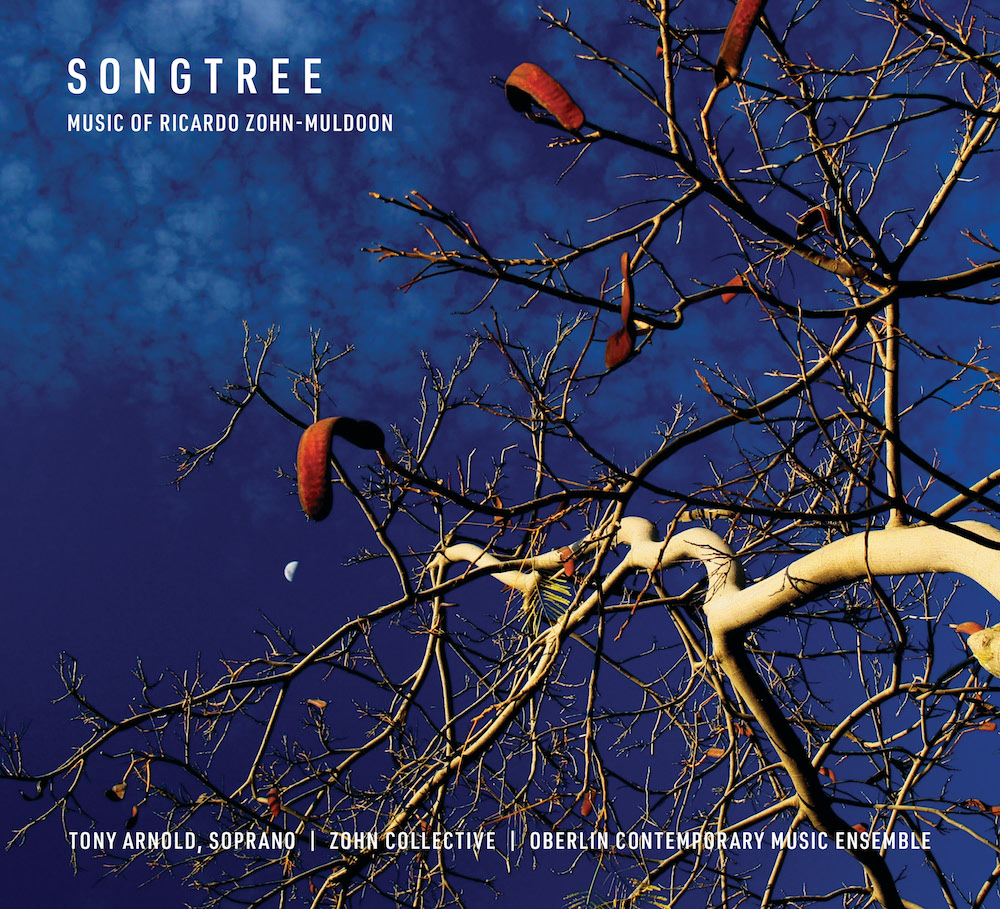by Jarrett Hoffman

Thirty-nine of the album’s fifty minutes belong to the title work, a fifteen-part song cycle performed here by conductor Timothy Weiss, soprano Tony Arnold, the Zohn Collective and friends, and two students from the Oberlin Contemporary Music Ensemble.
Three instrumental interludes separate settings of poems and aphorisms by Shakespeare and contemporary Mexican author Raúl Aceves. The texts absolutely deserve a close reading in the liner notes, whether it’s a refresher to the incredible tricks Shakespeare has up his sleeves, or an introduction to the spare, poignant writing of Aceves.
It’s best to read before listening so as to fully appreciate Zohn-Muldoon’s sensitive interpretations and repurposings of these texts. (The first words in his bio are not his name, or “winner of,” but that “literature inspires” many of his works.) What most stands out is his feel for the structure of the texts, especially the unforgettable moments when many of them turn on a dime. That turn — when the words shift in some slight way that has them take on new meaning, sending off a memo to your soul — is so hard for writers to pull off, and equally so for composers.
But Zohn-Muldoon is a master of it. To choose one example from many, his dreamy halting take on the last two lines of Shakespeare’s Sonnet 18 will stay with you long after listening.
Beautiful structural moments like that occur in many of the settings. Listeners might find that slightly repetitive, or be intrigued by the work’s fine layer of symmetry. I found myself reacting both ways, yet always remaining interested in what lay around the corner, and still itching to get to know this architecture more deeply.
The music demands a lot from its performers, whose disparate parts must lock in with the utmost precision — hair-raising stuff. But anyone familiar with the leadership of Weiss knows he’s the man for the job. It all comes across expertly measured, and captivating. Arnold and the Zohn Collective prove unflappable in the face of the work’s many challenges.
The soprano is often tasked with singing less as a soloist and more as one of the many crucial members of the ensemble, a role Arnold fulfills to a T. When presented with opportunities to step out square into the spotlight, she grips your attention like no other. Whew, does she sing beautifully up high: gently searing.
On either side of Songtree lie the third and fourth works in Zohn-Muldoon’s Candelabra series, conceived as memorials to members of his father’s family — Jews who left Vienna just before World War II and settled in Tlaquepaque, near Guadalajara.
The combination of Weiss, ten members of CME, and two from the Zohn impress in Candelabra III, written for his father. It begins tantalizingly, like a magician allowing a glimpse at something impossible, and closes with dramatic silences.
Separating Candelabra III from IV makes it difficult to hear Zohn-Muldoon’s intended arc. “Each successive work is a varied transcription of the previous one,” he writes, “as the musical ideas undergo a gradual evolution…in response to the new environment of a different instrumental combination.”
But that separation does accomplish two things. It gives the album an aspect of symmetry that’s important to the composer’s work. And it provides an ending that’s emotionally resonant in more than just an artistic way.
Candelabra IV is for Zohn-Muldoon’s father’s brother, Peter, who died as an infant, casting “a long shadow in the life of my father, who lost not only his brother, but in many ways his mother too.” The composer chose alto flute and guitar, “two beautiful but fragile instruments that often struggle to be heard.”
The excellent Duo Damiana (flutist Molly Barth and guitarist Dieter Hennings) gives quite a voice to little Peter. One moment of deep whispery playing from Barth and cool little strums and knocks from Hennings depicts the child almost mystically.
And maybe it’s just me, but the thread running between this piece and Shakespeare’s Sonnet 18 is something special. Where Zohn-Muldoon gives voice to Peter, the poet casts a similar spell on the subject of his sonnet during its memorable turn — spoiler alert:
So long as men can breathe or eyes can see,
So long lives this and this gives life to thee.
Published on ClevelandClassical.com December 13, 2018.
Click here for a printable copy of this article



